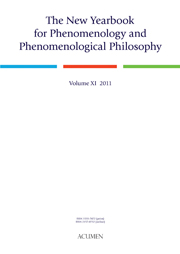Book contents
- Frontmatter
- Contents
- Articles
- Husserl and the Mind–Body Problem
- Phenomenological Kaleidoscope: Remarks on the Husserlian Method of Eidetic Variation
- Husserl and McDowell on the Role of Concepts in Perception
- Edmund Husserl's Europe: Borders, Limits and Crises
- The Ontological Status of Essences in Husserl's Thought
- Heidegger on Understanding One's Own Being
- Discussion
- In Review
- Conclusion
Edmund Husserl's Europe: Borders, Limits and Crises
from Articles
- Frontmatter
- Contents
- Articles
- Husserl and the Mind–Body Problem
- Phenomenological Kaleidoscope: Remarks on the Husserlian Method of Eidetic Variation
- Husserl and McDowell on the Role of Concepts in Perception
- Edmund Husserl's Europe: Borders, Limits and Crises
- The Ontological Status of Essences in Husserl's Thought
- Heidegger on Understanding One's Own Being
- Discussion
- In Review
- Conclusion
Summary
Abstract: This article examines the problem of cultural transformation—particularly the problem of modern Westernization—in the framework of Husserlian phenomenology. By focusing on the concept of limit in Husserl's late manuscripts, the article illustrates how Husserl conceives the concept of culture with regard to a twofold liminal structure: territoriality and teleology. In the birth of Greek philosophy, Husserl detects a radical transformation in the fundamental sense of both of these structures, which will be described as the deconstruction and deferment of cultural limits. The article argues that while Husserl was keen to uncover the expansionist motive of the European–occidental tradition, his aim was by no means to simply justify it on the basis of universal reason. Instead, Husserl aimed at articulating a novel theory of universalism that would be based on the ideas of self-critique and renewal, and that would conceive cultural transformation through a reciprocal relation between home and alien. By elaborating the twofold liminal structure of culture, the article will answer some of the critiques of Husserl's alleged Euro-centrism.
Keywords: Edmund Husserl; Europe; culture; universalism; teleology; territoriality.
“… so wird das erweiterte Europa eben nicht mehr Europa sein …”
—Edmund HusserlFor one reason or another, Europe seems to be the only continent that has serious difficulties in defining its own borders. Historically speaking, Europe has defined itself with regard to numerous sets of frontiers, beginning from Hecataus's identification of the rivers Nile and Phasis as separating Europe, respectively, from the continents of Libya and Asia. As a territorial entity, however, Europe has never been unequivocal; its history is that of an ambiguous, even chameleonic entity.
- Type
- Chapter
- Information
- The New Yearbook for Phenomenology and Phenomenological PhilosophyVolume XI 2011, pp. 75 - 95Publisher: Acumen PublishingPrint publication year: 2012



